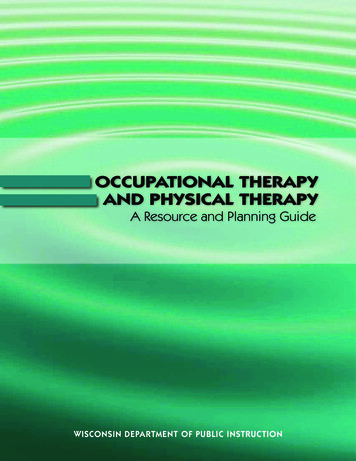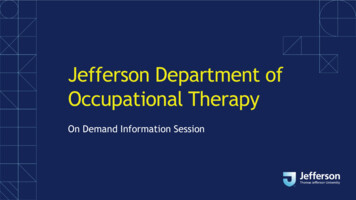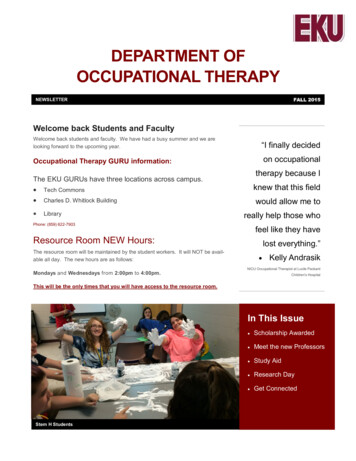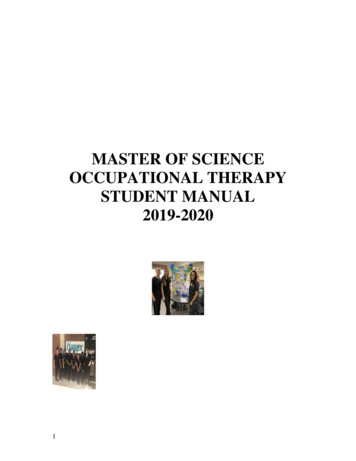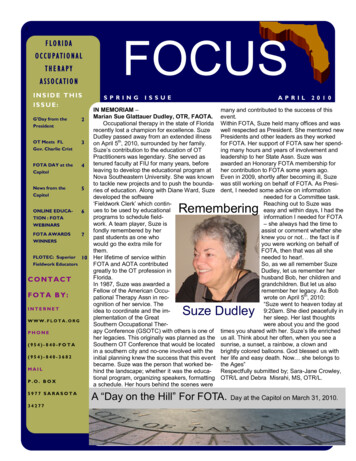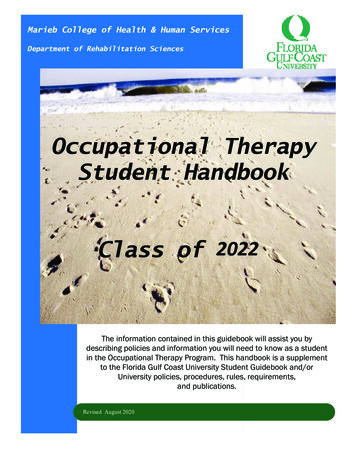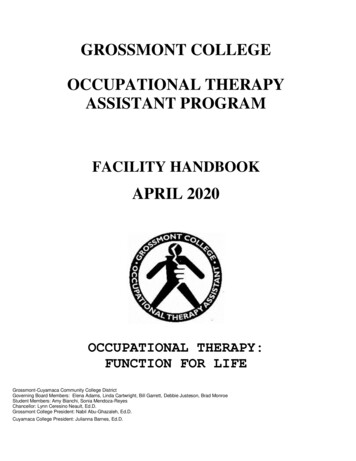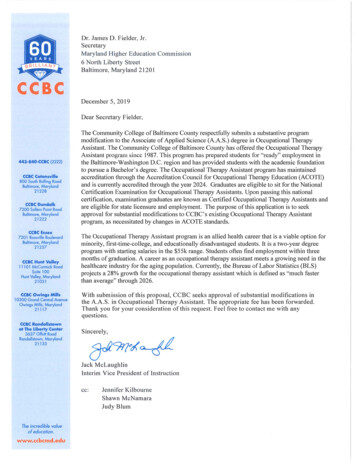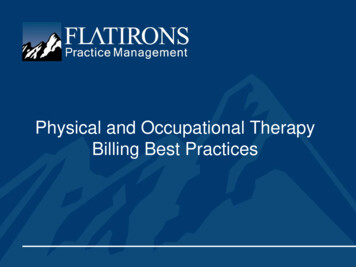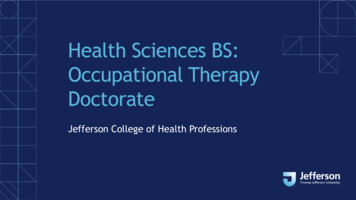
Transcription
D E PA R T M E N T O F O C C U PAT I O N A L T H E R A P YG R A D U AT E S T U D E N T P R O F E S S I O N A L H A N D B O O K
TABLE OF CO N TE N TSSECTION I ACADEMIC AND PROFESSIONAL GUIDELINESOccupational Therapy Definition.5Accreditation.5Vision .5Mission Statement.5Values .5Educational Objectives.5Philosophy of Occupational Therapy.6Educational Philosophy.6P-E-O Curriculum Model and Rationale.8Course Descriptions.14Admissions Policy and Criteria.19Application Process and Deadlines.19Selection Criteria.20STANDARDS OF CONDUCTGeneral Guidelines for Student Behavior.21Professionalism.21Student Job Description and Performance Standards.22Standards of Scholarship.23Academic Standards.24Academic Dishonesty.24Progression Policy.25Suspension and Dismissal.25Transfer Course Credit.26Withdrawing From a Course.26Retention Policy.26Procedure for Academic and Non-Academic Probation.26Remediation.27Readmission Policy.27Repeat Rule.27Graduation Policy.27Credentials.28Licensure/Certification.282
DEPARTMENT POLICIES & GUIDELINESAdvisement and Academic Counseling.29Student Professional Behavior Self-Assessment.29Community Service.29Student Health.29Accessibility Statement.29University Resources.30Safety and Confidentiality.30Material Safety Data Sheets.30Laboratory/Classroom Use Policy.30Laboratory/Privacy Policy.30Consent for Clinical Practice.31Check-out/Check-in Policy.33Emergency Procedures, Inclement Weather, and Evacuation.33Infection Control Policy.33Professional Organization and Membership.33AOTA 36North Carolina OT Association (NCOTA).33Ram-Student Occupational Therapy Association (SOTA).34COURSE EXPECTATIONS AND REQUIREMENTSGrading System.35Exams .35Comprehensive Semester and Final Exam A Guidelines.38Participation.38Professional Dress Attire.39Technology Statement.39Electronic Devices.39Human Subject Review.40GRIEVANCESGrade Appeal Process.41Grievances for Non-Grade Related Academic Issues.413
TABLE OF CO N TE N TSSECTION II GUIDELINES FOR FIELDWORK EDUCATIONRelationship of Fieldwork to the MSOT Curriculum .44Health and Fieldwork Requirements .45Procedures for Establishing Fieldwork Sites and Affiliation Agreements .49Assignment of Fieldwork Sites.50Communication between WSSU and FW Site .51Assessment of Student Performance and Learning Contracts .52Supervision Guidelines .53Resources for Students and Fieldwork Educators .54Fieldwork Related Expenses .55FW Policies .55Revised 3-2016Students are responsible for being aware of university, program, and departmental policiesregarding academic and professional behavior. For university policies refer to the graduatecatalog, for departmental and program policies refer to specific program student handbooks.Any conduct that violates the Student Code of Conduct will be referred to theOffice of Student Judicial Affairs.Winston-Salem State University is committed to equality of educationalopportunity and does not discriminate against applicants, students or employees based onrace, color, national origin, religion, sex, age or disability. Moreover, WSSU is open topeople of all races and actively seeks to promote diversity among its student population byrecruiting and enrolling students without regard to race, gender, or ethnicity.4
S E C TI ON IACA D E MIC A N D P R OF E S S I ON AL GU I DELI NESOCCUPATIONAL THERAPY DEFINITIONOccupational Therapy is a health and rehabilitation profession based on the belief that engagement in occupation isessential for well-being. Occupational therapists are skilled professionals who use a holistic approach that includesattention to mind, body, and spirit. Therapist works to improve capabilities of persons that are adversely affected bymental, developmental, emotional and physical conditions, and the aging process. The treatment environment isorganized to help persons of all ages to achieve their highest level of independent functioning for participating in theirchosen occupations.ACCREDITATIONThe Department of Occupational Therapy entry-level master’s program is fully accredited by the Accreditation Council forOccupational Therapy Education (ACOTE). The next accreditation self- study and onsite visit are scheduled in the year2016/2017. For information, contact ACOTE, c/o Accreditation Department, American Occupational Therapy Association(AOTA) located at 4720 Montgomery Lane, Suite 200, Bethesda, MD 20819-3449. The phone number for AOTA is(301) 652-2686.VISIONThe Department of Occupational Therapy envisions outstanding graduates and distinguished faculty who successfullyengage in promoting evidence-based practice, occupation-based research, leadership, service and life-long learning.MISSION STATEMENTThe Mission of the Occupational Therapy Program is to produce graduates who are clinically, professionally, andculturally competent in occupational therapy. Graduates will engage in evidence-based scholarship and service topromote equitable care that contributes to the quality of life for individuals and communities.VALUES Excellence - We strive to achieve excellence in academics, research and service. Cultural Competence - We aim to promote cultural competence and embrace diversity in all relations. Service - We are committed to cultivating service-oriented graduates who are competent to address healthinequalities. Leadership - We aim to demonstrate leadership through advocacy and participation in the profession. Ethics - We are committed to creating professionals who are caring and ethical, with a strong sense ofpersonal integrity.EDUCATIONAL OBJECTIVESThe Department of Occupational Therapy at WSSU endeavors to create a supportive and challenging environment, whileproviding excellent educational opportunities. Graduates of the Occupational Therapy program will: Incorporate occupation-based frames of reference and theoretical models in the delivery of therapeutic servicesthat ensure the best possible health outcomes for consumers. Devise and implement client-centered, evidence-based, and culturally relevant assessments and interventionsrequired of an entry-level practitioner. Demonstrate ability to manage resources and to provide services to diverse populations inclusive of healthdisparate environments and emerging arenas of practice. Apply principles of evidence-based research in scholarship and practice that contribute to the profession’s body ofscientific knowledge.5
SECTION I - ACADEMIC AND PROFESSIONAL GU IDELINES Act as an advocate to educate the public, to promote consumer health and wellness, and to provide communityand professional leadership and service.Demonstrate skill that shows effective communication and appreciation for diversity, cultural differences,occupational differences, and backgrounds of individuals.Employ technology in teaching, learning and adaptation of the environment.Engage in ethical behaviors and attitudes that demonstrate responsibility in adhering to the Code of Ethics andprofessional standards.PHILOSOPHY OF OCCUPATIONAL THERAPYOur program’s belief is consistent and in agreement with the Philosophical Base of OccupationStatement by the AOTA (revised, 2011) which is as follows: Occupations are activities that bring meaning to the daily lives of individuals, families, and communities and enablethem to participate in society. All individuals have an innate need and right to engage in meaningful occupationsthroughout their lives. Participation in these occupations influences their development, health and well-being acrossthe lifespan. As such, participation in meaningful occupation is a determinant of health. Occupations occur within diverse social, physical, cultural, personal, temporal, or virtual contexts. The quality ofoccupational performance and the experience of each occupation are unique in each situation due to the dynamicrelationship between factors intrinsic to the individual, the contexts in which the occupation occurs, and thecharacteristics of the activity. The focus and outcome of occupational therapy are individuals’ engagement in meaningful occupations thatsupport their participation in life situations. Occupational therapy practitioners conceptualize occupations as both ameans and an end to therapy. That is, there is therapeutic value in occupational engagement as a change agent,and engagement in occupations is also the ultimate goal of therapy. Occupational therapy is based on the belief that occupations may be used for health promotion and wellness,remediation or restoration, health maintenance, disease and injury prevention, and compensation/adaptation. The useof occupation to promote individual, community, and population health is the core of occupational therapy practice,education, research, and advocacy.”EDUCATIONAL PHILOSOPHYThe faculty members of the Occupational Therapy Program at Winston-Salem State University hold the following beliefsabout humans, how they learn, and education. These serve as the foundation for the curriculum and the selection ofinstructional methods. Each individual is valued for their uniqueness. Human behavior consists of dynamic interactionsamong the individual, the environment, and the demands of occupation. People derive a sense of self– fulfillment throughmastery and meaningful participation in daily occupations. An individual’s capacity to engage with the world throughoccupational performance or participation in productive and purposeful activities is crucial for the successful fulfillmentof societal roles and expectations. Occupational performance can be enabled, challenged, or compromised due toillness, injury, developmental issues or aging. When this occurs, humans are motivated to re- engage in those productiveactivities that are meaningful and that meet their goals. When given opportunities to use problem-centered approaches,people are motivated to utilize higher order critical think
The Department of Occupational Therapy at WSSU endeavors to create a supportive and challenging environment, while providing excellent educational opportunities. Graduates of the Occupational Therapy program will: Incorporate occupation-based frames of reference and t
